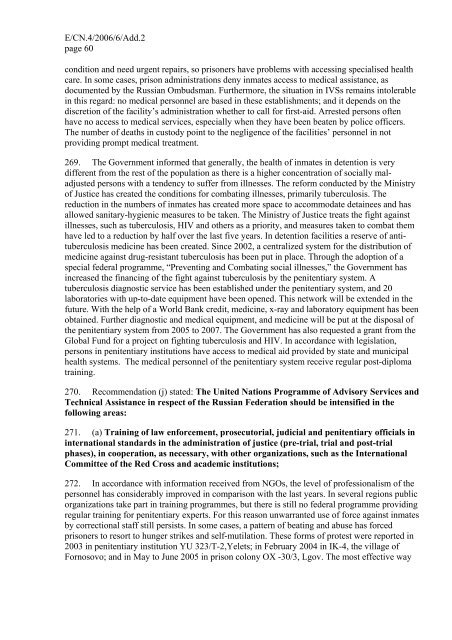E Economic and Social Council - acnudh
E Economic and Social Council - acnudh
E Economic and Social Council - acnudh
You also want an ePaper? Increase the reach of your titles
YUMPU automatically turns print PDFs into web optimized ePapers that Google loves.
E/CN.4/2006/6/Add.2<br />
page 60<br />
condition <strong>and</strong> need urgent repairs, so prisoners have problems with accessing specialised health<br />
care. In some cases, prison administrations deny inmates access to medical assistance, as<br />
documented by the Russian Ombudsman. Furthermore, the situation in IVSs remains intolerable<br />
in this regard: no medical personnel are based in these establishments; <strong>and</strong> it depends on the<br />
discretion of the facility’s administration whether to call for first-aid. Arrested persons often<br />
have no access to medical services, especially when they have been beaten by police officers.<br />
The number of deaths in custody point to the negligence of the facilities’ personnel in not<br />
providing prompt medical treatment.<br />
269. The Government informed that generally, the health of inmates in detention is very<br />
different from the rest of the population as there is a higher concentration of socially maladjusted<br />
persons with a tendency to suffer from illnesses. The reform conducted by the Ministry<br />
of Justice has created the conditions for combating illnesses, primarily tuberculosis. The<br />
reduction in the numbers of inmates has created more space to accommodate detainees <strong>and</strong> has<br />
allowed sanitary-hygienic measures to be taken. The Ministry of Justice treats the fight against<br />
illnesses, such as tuberculosis, HIV <strong>and</strong> others as a priority, <strong>and</strong> measures taken to combat them<br />
have led to a reduction by half over the last five years. In detention facilities a reserve of antituberculosis<br />
medicine has been created. Since 2002, a centralized system for the distribution of<br />
medicine against drug-resistant tuberculosis has been put in place. Through the adoption of a<br />
special federal programme, “Preventing <strong>and</strong> Combating social illnesses,” the Government has<br />
increased the financing of the fight against tuberculosis by the penitentiary system. A<br />
tuberculosis diagnostic service has been established under the penitentiary system, <strong>and</strong> 20<br />
laboratories with up-to-date equipment have been opened. This network will be extended in the<br />
future. With the help of a World Bank credit, medicine, x-ray <strong>and</strong> laboratory equipment has been<br />
obtained. Further diagnostic <strong>and</strong> medical equipment, <strong>and</strong> medicine will be put at the disposal of<br />
the penitentiary system from 2005 to 2007. The Government has also requested a grant from the<br />
Global Fund for a project on fighting tuberculosis <strong>and</strong> HIV. In accordance with legislation,<br />
persons in penitentiary institutions have access to medical aid provided by state <strong>and</strong> municipal<br />
health systems. The medical personnel of the penitentiary system receive regular post-diploma<br />
training.<br />
270. Recommendation (j) stated: The United Nations Programme of Advisory Services <strong>and</strong><br />
Technical Assistance in respect of the Russian Federation should be intensified in the<br />
following areas:<br />
271. (a) Training of law enforcement, prosecutorial, judicial <strong>and</strong> penitentiary officials in<br />
international st<strong>and</strong>ards in the administration of justice (pre-trial, trial <strong>and</strong> post-trial<br />
phases), in cooperation, as necessary, with other organizations, such as the International<br />
Committee of the Red Cross <strong>and</strong> academic institutions;<br />
272. In accordance with information received from NGOs, the level of professionalism of the<br />
personnel has considerably improved in comparison with the last years. In several regions public<br />
organizations take part in training programmes, but there is still no federal programme providing<br />
regular training for penitentiary experts. For this reason unwarranted use of force against inmates<br />
by correctional staff still persists. In some cases, a pattern of beating <strong>and</strong> abuse has forced<br />
prisoners to resort to hunger strikes <strong>and</strong> self-mutilation. These forms of protest were reported in<br />
2003 in penitentiary institution YU 323/T-2,Yelets; in February 2004 in IK-4, the village of<br />
Fornosovo; <strong>and</strong> in May to June 2005 in prison colony OX -30/3, Lgov. The most effective way
















